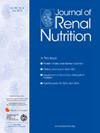Associations Between Dietary Potassium Intake From Different Food Sources and Hyperkalemia in Patients With Chronic Kidney Disease
IF 3.4
3区 医学
Q2 NUTRITION & DIETETICS
引用次数: 0
Abstract
Objective
Previous studies reported mixed results on associations between dietary potassium intake and hyperkalemia in patients with chronic kidney disease (CKD). This study investigated the association between potassium intake from different food sources and hyperkalemia in patients with non–dialysis-dependent CKD.
Methods
A total of 285 patients were recruited at a university hospital and 2 city hospitals in Tokyo. Dietary potassium intake was estimated by a validated diet history questionnaire. Associations of potassium intake from all foods and individual food groups with serum potassium were examined by multivariable linear regression among potassium binder nonusers. An association between tertile groups of potassium intake and hyperkalemia, defined as serum potassium ≥5.0 mEq/L, was evaluated by multivariable logistic regression.
Results
Among 245 potassium binder nonusers, total potassium intake was weakly associated with serum potassium (regression coefficient = 0.147, 95% confidence interval (CI): 0.018-0.277), while an association with hyperkalemia was not observed (first vs third tertile: adjusted odds ratio = 0.98, 95% CI: 0.29-3.26). As for food groups, potassium intakes from potatoes, pulses, and green/yellow vegetables were positively associated with serum potassium. Patients in the highest tertile of potassium intake from potatoes had higher odds of hyperkalemia as compared to those in the lowest tertile (adjusted odds ratio = 4.12, 95% CI: 1.19-14.34).
Conclusion
Total potassium intake was weakly associated with serum potassium, but not with hyperkalemia. Potassium intake from potatoes was associated with hyperkalemia. These findings highlight the importance of considering food sources of potassium in the management of hyperkalemia in CKD.
慢性肾病患者从不同食物中摄入的钾与高钾血症之间的关系。
目的:以往的研究对慢性肾脏病(CKD)患者膳食钾摄入量与高钾血症之间的关系报道不一。本研究调查了非透析依赖型 CKD 患者从不同食物中摄入的钾与高钾血症之间的关系:方法:在东京的一家大学医院和两家市立医院共招募了 285 名患者。方法:在东京的大学医院和两家市立医院共招募了 285 名患者,通过有效的饮食史调查问卷估算膳食中钾的摄入量。通过多变量线性回归研究了未使用钾粘合剂的患者从所有食物和个别食物组中摄入的钾与血清钾之间的关系。通过多变量逻辑回归评估了钾摄入量三等分组与高钾血症(定义为血清钾≥5.0 mEq/L)之间的关系:在 245 名未使用钾粘合剂的人群中,总钾摄入量与血清钾呈弱相关性(回归系数 = 0.147,95% 置信区间 (CI):0.018-0.277),而与高钾血症的相关性则未观察到(第一与第三三分位数:调整赔率 (aOR) = 0.98,95% CI:0.29-3.26)。在食物类别方面,马铃薯、豆类和绿色/黄色蔬菜的钾摄入量与血清钾呈正相关。马铃薯钾摄入量最高三分位数的患者与最低三分位数的患者相比,患高钾血症的几率更高(aOR = 4.12,95% CI:1.19-14.34):总钾摄入量与血清钾呈弱相关,但与高钾血症无关。从马铃薯中摄入的钾与高钾血症有关。这些发现强调了在治疗慢性肾脏病患者高钾血症时考虑钾食物来源的重要性。
本文章由计算机程序翻译,如有差异,请以英文原文为准。
求助全文
约1分钟内获得全文
求助全文
来源期刊

Journal of Renal Nutrition
医学-泌尿学与肾脏学
CiteScore
5.70
自引率
12.50%
发文量
146
审稿时长
6.7 weeks
期刊介绍:
The Journal of Renal Nutrition is devoted exclusively to renal nutrition science and renal dietetics. Its content is appropriate for nutritionists, physicians and researchers working in nephrology. Each issue contains a state-of-the-art review, original research, articles on the clinical management and education of patients, a current literature review, and nutritional analysis of food products that have clinical relevance.
 求助内容:
求助内容: 应助结果提醒方式:
应助结果提醒方式:


